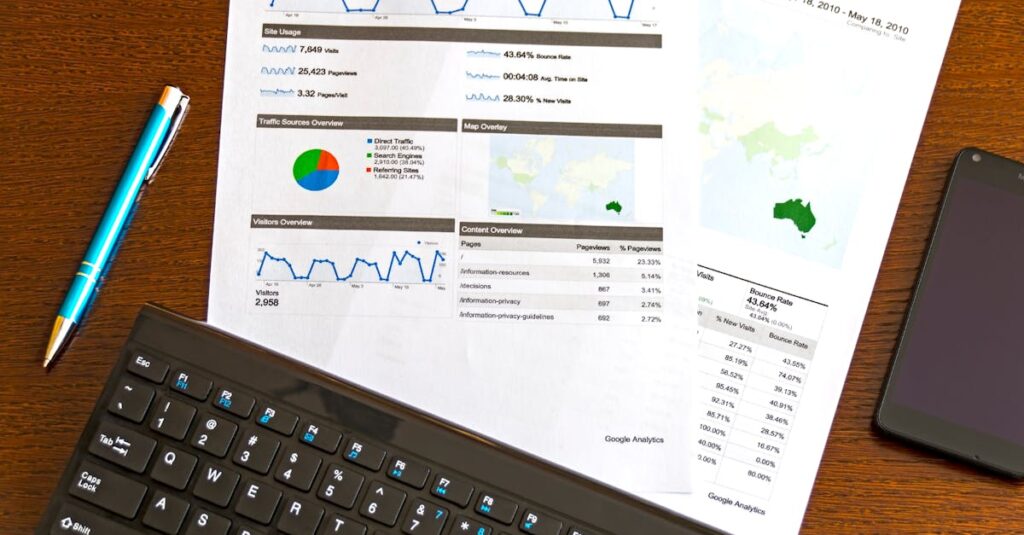Table of Contents
ToggleIn today’s fast-paced digital world, keeping an eye on your brand is more crucial than ever. Imagine your brand as a celebrity—wouldn’t you want to know what the gossip is? Brand monitoring is like hiring a personal bodyguard for your reputation, ensuring you catch both the applause and the occasional boo before it spirals out of control.
With social media buzzing and reviews popping up like popcorn, businesses can’t afford to sit back and relax. They need to actively listen to what customers are saying and respond like a pro. After all, a well-timed reply can turn a disgruntled customer into a loyal fan. So, let’s dive into the world of brand monitoring and discover how it can transform a mere name into a household favorite.
What Is Brand Monitoring?
Brand monitoring involves tracking and analyzing how a brand is perceived across various platforms, including social media, websites, and forums. This practice helps businesses understand customer sentiments and maintain their reputation. Companies can identify trends, gain insights, and measure brand health through regular monitoring.
Engaging with customer feedback is crucial. Brands that respond promptly to reviews and comments often foster loyalty among customers. This proactive approach can transform dissatisfied customers into brand advocates.
Various tools assist in brand monitoring by collecting data from multiple sources. These tools can showcase sentiment analysis, keyword tracking, and competition insights. By utilizing such resources, businesses gain a comprehensive view of their brand’s standing in the market.
Regular monitoring allows brands to adjust their strategies as needed. When businesses recognize negative trends early, they can implement corrective actions. An effective brand monitoring strategy directly contributes to enhancing brand visibility and credibility.
Overall, brand monitoring is essential for businesses aiming to thrive in a competitive digital landscape. It provides a roadmap for improving customer relations and refining marketing strategies based on real-time data.
Importance Of Brand Monitoring

Brand monitoring plays a critical role in maintaining and enhancing a company’s presence in the market. Through constant oversight, businesses can better understand how they are perceived and respond appropriately.
Reputation Management
Effective reputation management directly correlates with consistent brand monitoring. Brands must address both positive and negative feedback swiftly. Engaging with customer responses builds trust and loyalty, transforming critics into advocates. Brands that overlook this aspect risk damaging their reputation, as unresolved issues can lead to negative perceptions that spread quickly online. By actively monitoring reviews and comments, companies can foster stronger relationships, reinforcing their commitment to customer satisfaction.
Market Insights
Market insights derived from brand monitoring uncover valuable trends and sentiments. Companies gain a competitive edge by analyzing public perception across platforms. Understanding consumer preferences allows businesses to adjust strategies based on real-time data. This knowledge informs product development and marketing approaches, aligning offerings with customer expectations. Regularly reviewing market insights helps brands stay ahead in a dynamic marketplace, ultimately driving growth and enhancing visibility.
Tools For Brand Monitoring
Effective brand monitoring relies on the right tools. These tools enable businesses to track brand perception, manage reputation, and engage with customers seamlessly.
Social Media Monitoring Tools
Social media monitoring tools track brand mentions on platforms like Twitter, Facebook, and Instagram. Popular options include Hootsuite, Sprout Social, and Brandwatch. Each tool provides analytics that measure engagement rates, sentiment analysis, and audience demographics. These insights empower businesses to understand customer conversations. By promptly addressing feedback, brands can enhance customer relationships and foster loyalty. For instance, a quick response to a negative comment can prevent further escalation and showcase a commitment to customer satisfaction.
Online Review Platforms
Online review platforms like Yelp, Google Reviews, and Trustpilot play a crucial role in brand monitoring. Each allows businesses to view and respond to customer feedback publicly. Utilizing these platforms helps companies build credibility and trust. By actively engaging with reviews, whether positive or negative, brands can demonstrate their dedication to customer service. Responding to a five-star review with appreciation can strengthen brand loyalty, while addressing a one-star review with a solution can convert dissatisfied customers into advocates. Regular monitoring of these reviews supports continuous improvement and a positive brand image.
Techniques For Effective Brand Monitoring
Effective brand monitoring involves methods for data collection and analysis to understand public perception and sentiment. Companies that invest in these techniques improve their engagement and reputation management.
Data Collection Methods
Businesses utilize various data collection methods to track brand mentions. Social media platforms serve as a primary source, delivering insights from user conversations. Additionally, online review sites like Yelp and Google Reviews offer feedback from customers, capturing their experiences directly. Surveys and feedback forms also gather valuable opinions, allowing brands to explore customer sentiments. Companies often integrate analytics tools that automate data collection, streamlining the process and enabling real-time monitoring of brand mentions. Engaging with this data helps businesses identify trends and adjust their strategies accordingly.
Analyzing Brand Mentions
Analyzing brand mentions enhances understanding of how a brand is perceived. Companies assess both quantitative and qualitative data, measuring sentiment through tools like sentiment analysis software. Public conversations highlight customer feelings, revealing patterns in both positive and negative feedback. Through this analysis, brands can pinpoint areas needing improvement, whether related to products or customer service. Interpreting this data allows businesses to remain agile, making informed decisions that align with audience expectations. Regular analysis of brand mentions fosters continuous improvement, ensuring that brands adapt strategies in a fast-evolving marketplace.
Challenges In Brand Monitoring
Brand monitoring presents several challenges that companies must navigate effectively. First, the sheer volume of data generated across various platforms can overwhelm brands. Tracking mentions on social media, forums, and review sites requires robust tools and resources.
Second, distinguishing between genuine customer feedback and noise creates complexity. Misinterpretations of comments may lead to misguided responses. Companies need to focus on sentiment analysis to ensure accurate insights.
Third, brands face difficulties in responding to negative feedback promptly. Delayed reactions can escalate issues, leading to reputational damage. Monitoring all channels in real-time provides essential cover against potential crises.
Fourth, integrating data from diverse sources often proves challenging. Different platforms have distinct metrics, complicating unified analysis. Establishing a cohesive monitoring strategy helps streamline processes and provides clarity.
Fifth, interpreting the collected data to derive actionable insights can be intricate. Contextual understanding influences how effectively brands adapt their strategies. Analyzing both quantitative and qualitative data requires skilled teams capable of identifying patterns.
Lastly, changing consumer behaviors continuously evolve, affecting brand perception. Adapting to trends and shifts in sentiment takes diligence and flexibility. Companies must monitor industry changes to remain relevant.
Successfully addressing these challenges requires businesses to invest in effective brand monitoring tools and strategies. Consistent engagement with customers and proactive reputation management significantly contributes to brand health in the digital landscape.
Brand monitoring is essential for businesses aiming to thrive in a competitive digital environment. By actively tracking brand perception and engaging with customer feedback, companies can build trust and loyalty among their audience. The insights gained from effective monitoring not only enhance reputation management but also inform strategic decisions that align with customer expectations.
Investing in the right tools and techniques for brand monitoring allows businesses to navigate challenges and capitalize on opportunities. As consumer behaviors continue to evolve, staying attuned to public sentiment will be crucial for maintaining a strong market presence. Ultimately, a proactive approach to brand monitoring can transform a brand’s visibility and reputation, paving the way for sustained growth and success.




